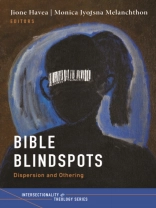Several of the ways and cultures that the Bible privileges or denounces slip by unnoticed. When those—the privileged and the denounced—are not examined, they fade into and hide in the blind spots of the Bible. This collection of essays engages some of the subjects who face dispersion (physical displacement that sparks ideological bias) and othering (ideologies that manifest in social distancing and political displacement). These include, among others, the builders of Babel, Samaritans, Melchizedek, Jezebel, Judith, Gomer, Ruth, slaves, and mothers. In addition to considering the drive to privilege or denounce, the contributors also attend to subjects ignored because the Bible’s blind spots are not examined. These include planet Earth, indigenous Australians, Palestinians, Dalits, minjungs, battered women, sexual-abuse victims, religious minorities, mothering men, gays, and foreigners.
This collection encourages interchanges and exchanges between dispersion and othering, and between the Bible and context. It flows in the currents of postcolonial and gendered studies, and closes with a script that stages a biblical character at the intersection of the Bible’s blind spots and modern readers’ passions and commitments.
Об авторе
Monica Jyotsna Melanchthon is a Lutheran pastor in the Andhra Evangelical Lutheran Church of India and associate professor of Old Testament at Pilgrim Theological College, within the University of Divinity (Melbourne, Australia).







![Обложка Brian Schrag & Julisa Rowe: Community Arts for God's Purposes [Chinese] 貼近神心意的社群藝術 Обложка Brian Schrag & Julisa Rowe: Community Arts for God's Purposes [Chinese] 貼近神心意的社群藝術](https://static.worldofdigitals.com/thumb_webp/740/9781645083740.webp)




